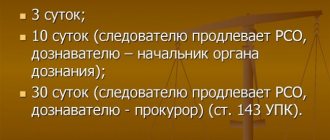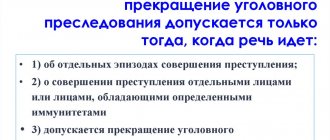Investigator Sidorov received a message from citizen Ivanov that his neighbor Vasily robbed a local grocery store. As evidence, Ivanov showed a video recording on his phone where Vasily discussed the process of a future robbery with his friend the day before the crime.
What will investigator Sidorov do? The answer is simple - check the information received. If the data is confirmed, then Sidorov will initiate a case - this is the first stage of the criminal process.
The investigator is given 3 days to check information about a committed or impending criminal offense and decide to initiate a case. The efficiency of further investigation depends on the efficiency of this process.
The actions of officials are not always legal. Often, the initiation of a case is accompanied by red tape and gross errors, which hinders the collection of evidence and the effective conduct of the investigation process.
To protect your rights, it is worth reading what grounds there may be for initiating a criminal case. And even if you are one hundred percent sure of your innocence, it is better to enlist the support of a lawyer.
Do you want to figure it out, but don’t have time to read the article? Lawyers will help
Entrust the task to professionals. Lawyers will complete the order at the cost you specify
27 lawyers on RTIGER.com can help with this issue
Solve the issue >
What reasons for initiating a case are specified in the law?
The reason for initiating a case is the sources of information about a crime (prepared or committed), which are legal facts. The investigator or inquiry officer is obliged to consider these facts and decide to initiate a criminal case if there are sufficient grounds.
According to Article 140 of the Code of Criminal Procedure, the following may be grounds for initiating a criminal case:
- confession;
- statement of a crime committed;
- the prosecutor's decision to forward the case materials to the preliminary investigation body to resolve issues of criminal prosecution;
- a message about a crime committed or being prepared.
They have the right to initiate a criminal case only if there is such a basis as the sufficiency of data indicating the signs of a crime.
Section VII. CRIMINAL PROCEEDINGS
RUSSIAN FEDERATION
CRIMINAL PROCEDURE CODE OF THE RUSSIAN FEDERATION
PART TWO. PRE-TRIAL PROCEEDINGS
Section VII. CRIMINAL PROCEEDINGS
Chapter 19. REASONS AND BASIS FOR INSTITUTION OF CRIMINAL PROCEEDINGS
Article 140. Reasons and grounds for initiating a criminal case
1. The reasons for initiating a criminal case are:
1) statement of a crime;
2) surrender;
3) a message about a crime committed or being prepared, received from other sources;
4) the prosecutor’s decision to forward the relevant materials to the preliminary investigation body to resolve the issue of criminal prosecution.
(Clause 4 introduced by Federal Law dated December 28, 2010 N 404-FZ)
2. The basis for initiating a criminal case is the presence of sufficient data indicating the signs of a crime.
Article 141. Statement of a crime
1. A statement about a crime can be made orally or in writing.
2. The written statement of the crime must be signed by the applicant.
3. An oral statement about a crime is entered into the protocol, which is signed by the applicant and the person who accepted this statement. The protocol must contain information about the applicant, as well as documents identifying the applicant.
4. If an oral report of a crime is made during an investigative action or during a trial, then it is entered, respectively, in the protocol of the investigative action or the protocol of the court session.
5. In the event that the applicant cannot be personally present when the protocol is drawn up, his application is drawn up in the manner established by Article 143 of this Code.
6. The applicant is warned of criminal liability for knowingly false denunciation in accordance with Article 306 of the Criminal Code of the Russian Federation, about which a note is made in the protocol, which is certified by the signature of the applicant.
7. An anonymous statement about a crime cannot serve as a reason to initiate a criminal case.
Article 142. Confession
1. A statement of confession is a voluntary report of a person about the crime he has committed.
2. A statement of confession can be made either in writing or orally. An oral statement is accepted and entered into the protocol in the manner established by part three of Article 141 of this Code.
Article 143. Report on detection of signs of a crime
A message about a crime committed or being prepared, received from sources other than those specified in Articles 141 and 142 of this Code, is accepted by the person who received this message, and a report on the discovery of signs of a crime is drawn up.
(as amended by Federal Law dated May 29, 2002 N 58-FZ)
Article 144. Procedure for considering a report of a crime
1. The inquiry officer, the inquiry body, the investigator, the head of the investigative body are obliged to accept, verify a message about any crime committed or being prepared and, within the competence established by this Code, make a decision on it no later than 3 days from the date of receipt of the specified message. When checking a report of a crime, the inquiry officer, the inquiry body, the investigator, the head of the investigative body has the right to demand documentary checks, audits, studies of documents, objects, corpses and to involve specialists in these checks, audits, studies, and to give the inquiry body a binding written order. on carrying out operational search activities.
(as amended by Federal Laws dated 03/09/2010 N 19-FZ, dated 12/28/2010 N 404-FZ)
2. Based on a report of a crime disseminated in the media, the inspection is carried out on behalf of the prosecutor by the inquiry body, as well as on the instructions of the head of the investigative body by the investigator. The editorial office and the editor-in-chief of the relevant mass media are obliged to hand over, at the request of the prosecutor, investigator or body of inquiry, the documents and materials at the disposal of the relevant mass media confirming the report of a crime, as well as information about the person who provided the specified information, except in cases where this the person set a condition to keep the source of information secret.
(as amended by Federal Law dated June 5, 2007 N 87-FZ)
3. The head of the investigative body, the head of the inquiry body has the right, at the motivated request of the investigator or interrogating officer, respectively, to extend the period established by part one of this article to 10 days. If it is necessary to carry out documentary checks, audits, studies of documents, objects, corpses, the head of the investigative body, at the request of the investigator, and the prosecutor, at the request of the investigator, has the right to extend this period to 30 days with a mandatory indication of the specific factual circumstances that served as the basis for such an extension.
(Part 3 as amended by Federal Law dated 03/09/2010 N 19-FZ)
4. The applicant is issued a document confirming the acceptance of a report of a crime, indicating information about the person who received it, as well as the date and time of its acceptance.
5. A refusal to accept a report of a crime may be appealed to the prosecutor or to the court in the manner established by Articles 124 and 125 of this Code.
6. The application of the victim or his legal representative in criminal cases of private prosecution, submitted to the court, is considered by the judge in accordance with Article 318 of this Code. In the cases provided for in part four of Article 147 of this Code, verification of a crime report is carried out in accordance with the rules established by this article.
(Part six as amended by Federal Law dated April 12, 2007 N 47-FZ)
Article 145. Decisions made based on the results of consideration of a report of a crime
1. Based on the results of consideration of a report of a crime, the body of inquiry, the inquiry officer, the investigator, the head of the investigative body makes one of the following decisions:
(as amended by Federal Laws dated 06/05/2007 N 87-FZ, dated 12/02/2008 N 226-FZ)
1) on the initiation of a criminal case in the manner established by Article 146 of this Code;
2) refusal to initiate criminal proceedings;
3) on the transfer of a report under jurisdiction in accordance with Article 151 of this Code, and in criminal cases of private prosecution - to the court in accordance with part two of Article 20 of this Code.
2. The applicant is informed about the decision made. At the same time, the applicant is explained his right to appeal this decision and the procedure for appealing.
3. If the decision provided for in paragraph 3 of part one of this article is made, the inquiry body, interrogating officer, investigator, head of the investigative body takes measures to preserve traces of the crime.
(as amended by Federal Laws dated 06/05/2007 N 87-FZ, dated 12/02/2008 N 226-FZ)
Chapter 20. PROCEDURE FOR INSTITUTION OF CRIMINAL CASE
Article 146. Initiation of a criminal case of public prosecution
1. If there is a reason and grounds provided for in Article 140 of this Code, the body of inquiry, the inquirer, the head of the investigative body, the investigator, within the competence established by this Code, initiate a criminal case, about which a corresponding resolution is issued.
(as amended by Federal Laws dated 04.07.2003 N 92-FZ, dated 06.05.2007 N 87-FZ, dated 02.12.2008 N 226-FZ)
2. The decision to initiate a criminal case shall indicate:
1) date, time and place of its adoption;
2) by whom it was issued;
3) the reason and basis for initiating a criminal case;
4) paragraph, part, article of the Criminal Code of the Russian Federation, on the basis of which a criminal case is initiated.
3. If a criminal case is sent to the prosecutor to determine jurisdiction, then a corresponding note is made about this in the decision to initiate a criminal case.
4. A copy of the resolution of the head of the investigative body, investigator, inquirer on the initiation of a criminal case is immediately sent to the prosecutor. When a criminal case is initiated by the captains of sea or river vessels on long voyages, by the heads of geological exploration parties or wintering camps remote from the locations of the investigative bodies, by the heads of diplomatic missions or consular offices of the Russian Federation, the prosecutor is immediately notified by these persons of the commenced investigation. In this case, the decision to initiate a criminal case is transferred to the prosecutor immediately when a real opportunity arises. If the prosecutor recognizes the decision to initiate a criminal case as illegal or unfounded, he has the right, no later than 24 hours from the moment of receipt of the materials that served as the basis for initiating a criminal case, to cancel the decision to initiate a criminal case, about which he issues a reasoned decision, a copy of which immediately forwards it to the official who initiated the criminal case. The head of the investigative body, the investigator, the inquiry officer shall immediately notify the applicant, as well as the person against whom the criminal case has been initiated, about the decision made.
(Part four as amended by Federal Law dated December 2, 2008 N 226-FZ)
Article 147. Initiation of a criminal case of private and private-public prosecution
(as amended by Federal Law dated April 12, 2007 N 47-FZ)
1. Criminal cases for crimes specified in part two of Article 20 of this Code shall be initiated only upon the application of the victim or his legal representative:
1) in relation to a specific person - in the manner established by parts one and two of Article 318 of this Code;
2) in relation to the person specified in Article 447 of this Code - in the manner established by Article 448 of this Code.
2. If an application is filed in relation to a person whose details are not known to the victim, then the magistrate refuses to accept the application for his proceedings and forwards the said application to the head of the investigative body or the head of the inquiry body to decide on the initiation of a criminal case, of which the person is notified. who submitted the application.
(as amended by Federal Law dated June 5, 2007 N 87-FZ)
3. Criminal cases regarding the crimes specified in part three of Article 20 of this Code are initiated only at the request of the victim or his legal representative. Proceedings in such criminal cases are conducted in accordance with the general procedure.
4. The head of the investigative body, the investigator, as well as the inquirer, with the consent of the prosecutor, initiate a criminal case for any crime specified in parts two and three of Article 20 of this Code, and in the absence of a statement from the victim or his legal representative in the cases provided for in part four of Article 20 of this Code Code.
(as amended by Federal Laws dated 06/05/2007 N 87-FZ, dated 12/02/2008 N 226-FZ)
Article 148. Refusal to initiate criminal proceedings
1. If there is no basis for initiating a criminal case, the head of the investigative body, the investigator, the inquiry body or the inquirer shall issue a resolution to refuse to initiate a criminal case. Refusal to initiate a criminal case on the grounds provided for in paragraph 2 of part one of Article 24 of this Code is permitted only in relation to a specific person.
(as amended by Federal Laws dated 04.07.2003 N 92-FZ, dated 06.05.2007 N 87-FZ, dated 02.12.2008 N 226-FZ)
1.1. A decision to refuse to initiate a criminal case in connection with a reasoned decision of the prosecutor to send the relevant materials to the preliminary investigation body to resolve the issue of criminal prosecution based on violations of criminal law identified by the prosecutor, made on the basis of paragraph 2 of part two of Article 37 of this Code, may be made only with the consent of the head of the investigative body.
(Part 1.1 introduced by Federal Law dated December 28, 2010 N 404-FZ)
2. When making a decision to refuse to initiate a criminal case based on the results of checking a report of a crime related to the suspicion of its commission by a specific person or persons, the head of the investigative body, the investigator, the inquiry body are obliged to consider the issue of initiating a criminal case for knowingly false denunciation against a person who has declared or disseminated a false report of a crime.
(as amended by Federal Laws dated 06/05/2007 N 87-FZ, dated 12/02/2008 N 226-FZ)
3. Information about the refusal to initiate a criminal case based on the results of checking a report of a crime disseminated by the media is subject to mandatory publication.
4. A copy of the decision to refuse to initiate a criminal case is sent to the applicant and the prosecutor within 24 hours from the date of its issuance. At the same time, the applicant is explained his right to appeal this decision and the procedure for appealing.
5. The refusal to initiate a criminal case may be appealed to the prosecutor, the head of the investigative body or to the court in the manner established by Articles 124 and 125 of this Code.
(as amended by Federal Law dated June 5, 2007 N 87-FZ)
6. Having recognized the decision of the body of inquiry, the interrogator on the refusal to initiate a criminal case as illegal or unfounded, the prosecutor cancels it and sends the corresponding resolution to the head of the body of inquiry with his instructions, setting a deadline for their execution. Having recognized the refusal of the head of the investigative body, the investigator to initiate a criminal case as illegal or unfounded, the prosecutor, no later than 5 days from the receipt of the materials for verifying the crime report, cancels the decision to refuse to initiate a criminal case, about which he issues a reasoned resolution outlining the specific circumstances subject to additional verification, which, together with the specified materials, is immediately sent to the head of the investigative body. Having recognized the refusal of the head of the investigative body or investigator to initiate a criminal case as illegal or unfounded, the relevant head of the investigative body cancels it and initiates a criminal case or sends materials for additional verification with his instructions, setting a deadline for their execution.
(Part 6 as amended by Federal Law dated December 28, 2010 N 404-FZ)
7. Having recognized the refusal to initiate a criminal case as illegal or unfounded, the judge makes a corresponding decision, sends it for execution to the head of the investigative body or the head of the inquiry body and notifies the applicant about it.
(as amended by Federal Law dated June 5, 2007 N 87-FZ)
Article 149. Direction of a criminal case
After a decision has been made to initiate a criminal case in the manner prescribed by Article 146 of this Code:
1) has become invalid. — Federal Law of June 5, 2007 N 87-FZ;
2) the investigator begins the preliminary investigation;
3) the inquiry body carries out urgent investigative actions and forwards the criminal case to the head of the investigative body, and in criminal cases specified in part three of Article 150 of this Code, conducts an inquiry.
(as amended by Federal Law dated June 5, 2007 N 87-FZ)
Statement
The most common reason to bring a case is to receive a report of a crime. Moreover, such a message is accepted and considered regardless of whether harm was caused to anyone or not.
According to Article 141 of the Code of Criminal Procedure, a statement can be oral or written. If it is drawn up on paper, then the applicant must sign. The requirements for the written version are as follows:
- it is entered into the protocol and signed by the one who submitted and the one who accepted;
- the passport details of the person are indicated;
- if the message was received during an investigative event, then it is entered into the protocol of this event.
Important! An anonymous statement cannot be the reason for initiating a criminal case. So, if a note was thrown into the police department’s mailbox stating that Popov is a thief, this will not be a reason to run to Popov and initiate a case.
Procedure for considering reports of a crime
The consideration of reports of crimes constitutes the content of the stage of initiating a case and includes the reception, registration, verification of primary information and making a decision on it (Part 1 of Article 144 of the Code of Criminal Procedure of the Russian Federation).
The procedure for registering reports of a crime.
Reception and registration of reports of crimes is carried out by law enforcement agencies, most often at the duty station of a police department.
Officials are obliged to accept the message, regardless of the type of crime, the place and time of its commission, or the completeness of the information. Reception of a crime report ends with appropriate registration (in the book of records of reports of incidents in the internal affairs bodies and similar books in other preliminary investigation bodies). The registration procedure is established by departmental instructions.
The applicant is given a document confirming the acceptance of a crime report (notification coupon) indicating information about the person who received it, as well as the date and time of its acceptance. The refusal to accept a message can be appealed by the applicant to the prosecutor or to the court in accordance with Articles 124 and 125 of the Code of Criminal Procedure of the Russian Federation (Part 5 of Article 144 of the Code of Criminal Procedure of the Russian Federation).
Methods for checking crime reports.
Verification of a crime report is of a logical nature, carried out for each statement or message and only within the framework of the information that is available in the received material. It is carried out in the form of analysis and evaluation of information contained in documented statements or reports of a crime. Without such verification, it is highly doubtful that any legal, informed decision will be made. Essentially, in this case, the meaning of the received information is clarified, its content is logically determined, in order to give it a legal assessment and make a specific decision.
In cases where the received materials do not contain enough information to make a decision, verification actions are carried out, the essence of which is to collect additional information that confirms or refutes the initial information about the crime.
Verification means are non-coercive methods of collecting evidence. These include obtaining samples for comparative research, various certificates, conducting audits, documentary checks, inventory, and forensic examinations. A number of verification activities are initiated by issuing written instructions to the body of inquiry to carry out operational investigative activities. Carrying out such actions is provided for in Part 4 of Art. 21, art. 144 Code of Criminal Procedure of the Russian Federation.
Part 1-1 Art. 144 of the Code of Criminal Procedure of the Russian Federation determines the procedure for obtaining explanations from eyewitnesses and the applicant. It is explained to the respondents that when carrying out these procedural actions they may not testify against themselves, their spouse and other close relatives, the circle of whom is determined by Art. 5 of the Code of Criminal Procedure of the Russian Federation, that they can use the services of a lawyer, as well as file complaints against the actions (inaction) and decisions of the inquiry officer, the body of inquiry, the investigator, the head of the investigative body in the manner established by Chapter 16 of the Code of Criminal Procedure of the Russian Federation. Participants in the verification of a crime report may also be warned about the non-disclosure of data from pre-trial proceedings in the manner established by Art. 161 Code of Criminal Procedure of the Russian Federation. If necessary, the safety of a participant in pre-trial proceedings is ensured in the manner prescribed by Part 9 of Art. 166 of the Code of Criminal Procedure of the Russian Federation, including when receiving a report of a crime. So, in accordance with Part 2 of Art. 2 of the Federal Law “On State Protection of Victims, Witnesses and Other Participants in Criminal Proceedings,” the applicant, eyewitness or victim of a crime, or other persons who contributed to the prevention or detection of a crime may be subject to state protection before the initiation of a criminal case.
If information about a crime was received from the media, then the editorial board of the media must, at the request of the criminal prosecution authorities, transfer to them the materials at its disposal about the crime (Part 4 of Article 21 of the Code of Criminal Procedure of the Russian Federation). At the same time, the editors have the right not to report information about the person who provided the information if this person has set a condition of non-disclosure of his name.
In order to prevent the stage of initiating a criminal case from being replaced by the stage of preliminary investigation, the legislator limits the possibility of conducting investigative actions aimed at collecting and verifying evidence and their sources before initiating a case, but, compensating for its prohibition, allows for the possibility of a fairly wide use of other procedural actions, with the help of which You can procedurally consolidate and verify the received statement or report of a crime. In this regard, the possibilities of establishing the circumstances of the crime committed at this stage are much narrower than during the preliminary investigation.
Thus, according to the current legislation, procedural activities at this stage are carried out, with few exceptions, without investigative actions. As a general rule, the conduct of investigative actions (as having a compulsory nature) before a decision to initiate a criminal case is made, except for inspections of the scene of the incident, objects and documents, corpses (Part 2 of Article 176 of the Code of Criminal Procedure of the Russian Federation), examination and forensic examination (Part 1, Article 144 of the Code of Criminal Procedure of the Russian Federation).
Thus, we can conclude that an inspection is a speculative and practical activity of preliminary investigation officials, carried out in accordance with the norms of criminal procedure law and aimed at obtaining, recording and evaluating the factual data necessary to resolve statements and messages.
Time limits for conducting an investigation into a crime report.
The period for procedural verification of reports of crimes is up to 3 days from the date of receipt of the report of a crime. This period may be extended to 10 days at the request of the investigator or inquiry officer, respectively, by the head of the investigative body or the head of the inquiry body. If it is necessary to conduct documentary checks, audits, forensic examinations, studies of documents, objects, corpses, as well as operational investigative activities, this period can be extended to 30 days by the prosecutor at the request of the investigator or the head of the investigative body at the request of the investigator.
The deadline for making a decision established by the legislator - 30 days - is calculated from the moment the application or message is received by the relevant government body and until it is resolved, that is, until a decision is made to initiate a case or to refuse it. Under no circumstances can it be extended; this period is final; further verification activities at the stage of initiating a criminal case are not permitted by the legislator.
Confession of a crime
If a person repents of a criminal offense, he can admit his guilt orally or in writing - then he will be issued a confession.
Often this mitigates the guilt of the offender in a criminal case. In some cases, the court cancels the actual punishment, replacing it with a conditional one, if the offender voluntarily repented and helped the investigation.
Important. Repentance does not always help mitigate punishment. If the criminal decided to confess only at the moment when they began to suspect him, then the court is unlikely to consider this a mitigating circumstance.
Sometimes a confession can be the basis for release from criminal punishment or for choosing a lighter measure of restraint (undertaking not to leave the place). In addition, turning yourself in is important evidence of guilt in a criminal offense.






